Insurgents Linked To Al Qaeda Capture Iraq’s Second City
Things only seem to be getting worse in Iraq.
An insurgent group linked to al Qaeda has seized control of one of Iraq’s largest and most strategically important cities:
BEIRUT — Insurgents seized control early Tuesday of most of the northern Iraqi city of Mosul, including the provincial government headquarters, offering a powerful demonstration of the mounting threat posed by extremists to Iraq’s teetering stability.
Fighters with the Islamic State of Iraq and Syria (ISIS), an al-Qaeda offshoot, overran the entire western bank of the city overnight after Iraqi soldiers and police apparently fled their posts, in some instances discarding their uniforms as they sought to escape the advance of the militants.
In Baghdad, Prime Minister Nouri al-Maliki announced a “general mobilization” and asked parliament to declare a state of emergency, saying the government would not allow the area to fall “under the shadows of terror and terrorists.”
Iraq’s speaker of parliament, Osama Nujaifi, said Mosul, Iraq’s third-largest city and the effective capital of northern Iraq, is now entirely in insurgent hands.
“When the battle got tough in the city of Mosul, the troops dropped their weapons and abandoned their posts, making it an easy prey for the terrorists,” he told a televised news conference in Baghdad.
All key facilities are now controlled by the insurgents, including the airport and the prisons, said Nujaifi, who is from Mosul.
“Everything is fallen. It’s a crisis,” he said, appealing for international and government help to retake the city. “Having these terrorist groups control a city in the heart of Iraq threatens not only Iraq but the entire region.”
In declaring the state of emergency in a televised speech, Maliki called on “all powers — political, financial and popular — to stop the terrorism and bring life to normal in the areas controlled by the terrorists in Mosul or any other city.”
He said his government has created a special Crisis Unit to deal with the situation and warned that punishment would be meted out to “those who were reckless and those who did not rise to the challenge” of the attack on Mosul.
The speed with which one of Iraq’s biggest cities has fallen under militant control is striking and suggests the U.S.-trained Iraqi security forces are even more vulnerable than had previously been thought.
The collapse of government forces in Mosul echoed the takeover earlier this year of the town of Fallujah in western Anbar province, where U.S. troops fought some of their fiercest battles of the Iraq war in an effort to quell the insurgents.
Mosul, however, is a far more important city, the capital of northern Iraq and a key commercial and trading center. It had also been an important focus of the U.S. military’s effort to stabilize Iraq.
The capture of the airport, which had served as a major hub for the U.S. military, could not be independently confirmed, but Nujaifi said it had been seized and that all of the aircraft there also were captured.
More from the BBC:
The BBC’s Jim Muir in Beirut says ISIS has been informally controlling much of Nineveh province for months, imposing tolls on the movement of goods and demanding protection money from local officials.
After five days of fighting, they took control of key installations in Mosul, which has a population of about 1.8 million.
Prime Minister Nouri Maliki, who is struggling to form a government in the wake of the April elections, has vowed to drive the ISIS “terrorists” out of mainly-Sunni Mosul in short order.
He is unlikely to succeed soon. He made similar vows when Sunni militants took over Falluja, west of Baghdad, in January, and they are still there.
It is not yet clear whether it is only ISIS involved in the Mosul takeover. In Falluja and its province, Anbar, Mr Maliki has clearly alienated many Sunni tribesmen and others, creating fertile soil for the radicals.
Internet images of local youths and even children stoning Iraqi security vehicles as they fled Mosul suggest that the Shia PM is not popular there either.
ISIS is also actively fighting in neighbouring eastern Syria to establish its control there, apparently aiming to straddle the border with an Islamic state.
If Mr Maliki is to defeat the Sunni radicals, he may need the help of Kurdish forces from the north. That will come with a heavy price tag, and they have in any case so far refused.
(…)
Osama al-Nujaifi, the speaker of parliament and brother of Nineveh’s governor, called on the Iraqi government and Kurdistan Regional Government to send reinforcements to Mosul to “fight the terrorists”, whom he said had seized military hardware, including helicopters.
Hayes Brown makes these observations:
Mosul is on the border with Syria, including area that the United Nations was considering using to channel aid to the thousands displaced during that country’s civil war, and making it strategically important to the militants now in control. ISIS originally formed out of an alliance between Al Qaeda in Iraq (AQI) and jihadist groups in Syria two years ago as the Syrian civil war was entering its current, deadly phase. Though the group originally tried to mask its brutality through civilian outreach such as a day filled with ice-cream and tug of war competitions, that facade has since fallen away. Among the tactics the group reportedly uses for intimidation purposes within Syria: crucifixion.
The group has also spent the last year fighting against not just the Syrian government, but also fellow jihadi group Jabhat al-Nusra. The latter is core al Qaeda’s preferred group in Syria and the fight between the two has led al Qaeda leadership to officially disavow the group. ISIS “is not a branch of the al-Qaeda group . . . does not have an organizational relationship with it and [al-Qaeda] is not the group responsible for their actions,” al-Qaeda’s General Command said in February. The group is also feuding with Iran-backed terrorist group Hezbollah — the latter of whom is Shiite, while ISIS is Sunni — having detonated car bombsin Lebanon targeting neighborhoods where Hezbollah is strong.
After a brief period of relative calm, political violence became a fact of life in Iraq not too long after the U.S. completed its withdrawal to the point where car bombings and similar attacks have become nearly as common as they were during the worst of the uprising that occurred in after the fall of Saddam Hussein. As this chart shows, there has been a dramatic uptick in civilian deaths attributable to insurgent attacks after a five year period when they were relatively low compared to 2006-2007:
To a large degree, it appears that the uptick in deaths and attacks has occurred as the Iraqi political system has continued to break down. The coalition of interest groups in charge in Baghdad seems to be capable of little more than inertia, which has allowed insurgent groups like ISIS to come in and start reasserting themselves.
Additionally, the civil war in Syria and the manner in which it has attracted jihadists and al Qaeda sympathizers has also had an impact on events inside Iraq. To some degree, it appears that this is partly due to the fact that the Iraqi government is either unable or unwilling to do anything about the fact that many of the worst elements of the Syrian resistance have taken to seeking refuge in western Iraq just across the Syrian border. Given that power vacumn, it’s no surprise that groups like ISIS would seek to expand their power in this manner.
It will be interesting to see how the Iraqi Government responds to this. In the worst case scenario, we could end up seeing the Syrian Civil War spread across the Iraqi border.
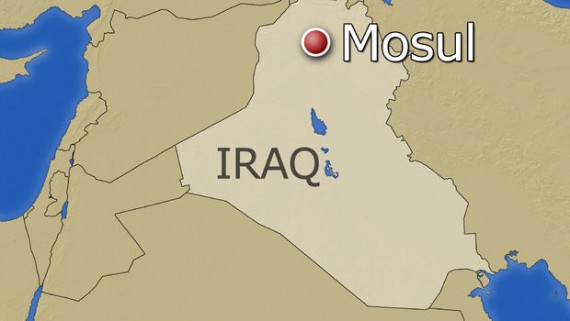
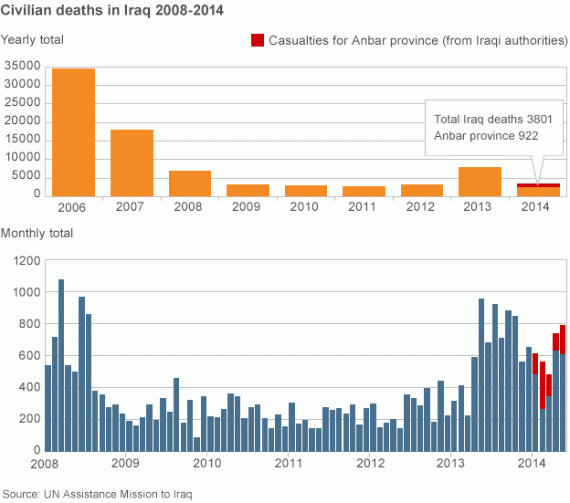

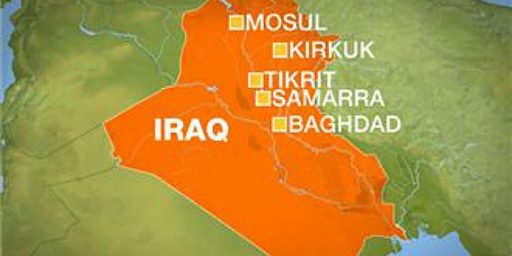

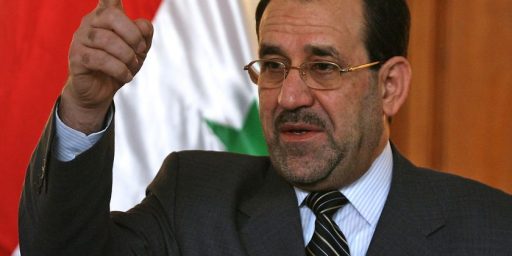
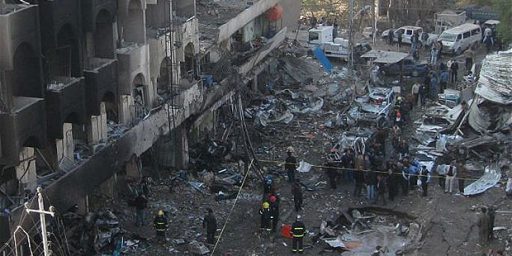
That happened long since. See here, here, and here.
I see that the Peshmerga contributed some 2000 soldiers to clearing Mosul in the battle fought there in 2004. It would be interesting to know the response of the Kurds to the ISIS and AlNusra, etc.
Iraq has been in a terrible shape, but thanks to America withdrawing from it the news didn’t have to cover all that was going on at Iraq for all these years.
In the Mideast we can pretty much expect a conflict of religions and interests of 3 different groups. The two main groups of Muslims and moderates that have more ties to the West, perhaps including Christianism.
I don’t understand what al-Qaeda has to do with it? I thought al-Qaeda were terrorists, not government branches or major religious groups.
I do expect that the 3 groups will continue to have conflicts over who is in power in those areas. Also there were some baddies over there nearer the Turkish border whom Turkey didn’t like that much either, I guess…
Maybe the Iraq war will be a 100 years war. Maybe Iraq needs a Sheriff. 😉
@JohnMcC:
“It would be interesting to know the response of the Kurds to the ISIS and AlNusra, etc.”
Probably getting ready to defend themselves against incursions aimed at mass killings of their people.
Why did we not seriously consider breaking up the country into three separate countries? Oh yeah there was concern over the undue influence upon Iraq by it’s neighbors we don’t get along with the best. Well this solution seems to be working out for the best interests of everyone involved. Maybe destroying this country and bankrupting ours in the process wasn’t the best idea, but goddamn I bet Halliburton made a fortune.
So much for the Obama claim about AQ being taken down.
@Moosebreath: From your keyboard to God’s eyeballs. That’s what I would be doing if I couldn’t find a way to get a green card.
@Dave D:
Beyond messy, and it would have solved next to nothing. Besides, the real partitioning of Iraq happened during the post invasion ethnic cleansing.
http://gulfanalysis.wordpress.com/category/iraq-and-soft-partition/
@Orange: Iraq had a sheriff and his name was Saddam Hussein. Can anyone explain to me how the people of Iraq or US interests are better served now than before we took Saddam out? Blood and treasure wasted!
@ Florack
Obama said Al Qaeda had been “decimated”…
Not sure if you are aware of it, but words mean things.
@CB:
This seems to fail to understand that has already happened as ISIS is still in control of Fallujah, and now apparently also Mosul. Whether they keep Mosul will likely depend on whether Maliki can actually respond to this with force, and on what the Kurdish militias decide to do. But as of right now it does seem that the Sunni locals do support ISIS or at least lack the will and or force to expel them from the area. However, if the Sunni Awakening was an indication they can rally force behind them so it would seem an issue of will. What the best policy for this region is one can really only guess and hope for the best, which seemingly has been our foreign policy since Saddam was toppled.
@Eric Florack:
Please link to that claim, because I sure don’t remember him ever saying that.
@Dave D: Because the US cannot agree to an independent kurdish state without seriously pissing off the Turks, our last ally in the area.
@anjin-san:
Yes, they do, and I couldn’t recall off the top what words he used.
But even that was a lie, wasn’t it, Anjin?
I would think eventually, you’d get tired of defending him.
Lets take a trip in the WABAC Machine destination 2003.
For the Gold:
WTF?
http://www.independent.co.uk/news/world/middle-east/the-vicious-schism-between-sunni-and-shia-has-been-poisoning-islam-for-1400-years–and-its-getting-worse-9139525.html
Mission Accomplished
In reality, Barnes got it fairly close to right.
Thing is, with the change of leadership, we walked away from the commitment we made.
@Eric Florack: Gosh, and everyone else in the whole world believes that we made a commitment TO WALK AWAY unless the Iraqis approved a Status of Forces Agreement. At least that’s what the Bush administration claimed.
Darn, we are so lucky to have you here, sir. Keep us informed frequently!
@Eric Florack:
You’ve got to love a guy like Florack who will crap on the dining table then complain to the waiter!
Just slink back into your hole bit.
Things have developed not necessarily to our advantage…
We can’t pivot from the Middle East fast enough. Thanks, Obama.
Found an article that lays the challenges that Iraq faces:
* A Sectarian Army with F-16 Fighter Jets – http://rudaw.net/english/opinion/100620141
@JohnMcC:
Perhaps you forgot… wed already won there.
We left Iraq because Obama though Afghanistan… which he is also losing, by the way, was the real war.
(Snort)
And by the way… “its all WS fault” ain’t cutting it, this many years on.at some point, reality steps in, except where Democrats are defending Dear Leader, apparently
It figures that someone like Florack would trot out the Dolchstoss theory as to why Iraq is falling apart…here’s a clue, just like Vietnam, we never should have gone there in the first place…
But saddam was a really bad guy who was behind 9/11 and had WMDs. Send Bremer back in. He had some bang up ideas like disbanding the army and outlawing Baathists from running civil society
@Eric Florack:
I’m confused, are you blaming Obama for honoring the status of forces agreement signed by Bush? Are you saying that contra to the agreement made between the US and Iraq under Bush Obama should have sent move forces into Iraq?
@Grewgills: it’s just an agreement between two autonomous nations. Iraq didn’t really mean to sign it. I think they had their fingers crossed at the time.
@ Florack
Ok, just proved Obama lied. You’ve already been caught in one lie tonight, can you back up anything you say?
I will stand by. Good thing the Giants game is on.
@Dave D:
Just pointing out that partition was never really an option. I disagree with some of what Visser has to say, but there it is.
And dammit, this place has kind of gotten ridiculous..
@Eric Florack: from “being on the run” to “actually running things” in just a few short years, who knew…..aside from anyone with a 3 digit iq?!
@Eric Florack: You see, we are so full of misconceptions about Operation Iraqi Liberation. It’s wonderful to have someone like yourself, our esteemed neighbor, to explain that “wed (sic) won there”. I mean, most of us thought that we were lucky to be able to escape an obvious disaster. But it turns out that Iraq was a triumph. What would we do without your wisdom, explaining that we are making the mistake of actually trusting our eyes instead of resting comfortably on right-wing-nut-jobs radio shows. Doggonnit! I bet you could even bolster your argument with quotes from Mr Paul Wolfowitz or General Ollie North. Who can doubt?
Same with the Afghanistan conflict, you see. Everyone who voted for the winner in ’08 and ’12 has thought that we were sailing comfortably to great triumphs there — establishing universities and seeding industries, building roads and seaports. But the insightful Mr Florick is kind enough to drop in and explain that actually Mr Obama has single-handedly lost that war. Mr Karzai’s feelings will be somewhat hurt, I guess. But the truth has come out; so sorry.
Thanks further for explaining that nothing — not one single thing — is “WS” fault. I had stupidly thought that Wall Street had a lot to do with our national travail.
Please come by often with your insights!